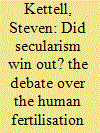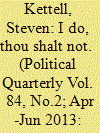| Srl | Item |
| 1 |
ID:
086975


|
|
|
|
|
| Publication |
2009.
|
| Summary/Abstract |
The debate over the 2008 Human Fertilisation and Embryology Bill marks the latest in a series of conflicts between secularism and religion in the public sphere. The failure of religiously motivated campaigners to alter the Bill's most substantive and controversial provisions, however, should not be seen as a victory for a homogeneous secular camp. Although campaigners motivated by religious belief were almost universally opposed to the Bill, secular campaigners reflected a more varied mix of opinion. Moreover, the degree of organisation and mobilisation shown by the religious lobby during the course of the debate, are a sign that attempts to secure a greater role for religion in the public sphere are likely to remain a prominent feature of British political life.
|
|
|
|
|
|
|
|
|
|
|
|
|
|
|
|
| 2 |
ID:
117552


|
|
|
| 3 |
ID:
122486


|
|
|
|
|
| Publication |
2013.
|
| Summary/Abstract |
Proposals to legalise same-sex marriage have provoked one of the most high-profile and controversial political debates in recent years. The plans, being introduced by the governments at Westminster and Holyrood, have divided political and public opinion and have attracted widespread opposition from religious groups. However, while religious attitudes to homosexuality are shaped by theological concerns, religious justifications have been largely absent from the case against same-sex marriage. Instead, religious groups have presented their arguments in secular terms centred on tradition, social utility, democratic values and the threat to religious rights and freedoms. This particular framing of the issue reflects processes of secularisation, a growing use of identity politics and the composition of religious groups themselves.
|
|
|
|
|
|
|
|
|
|
|
|
|
|
|
|